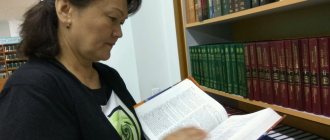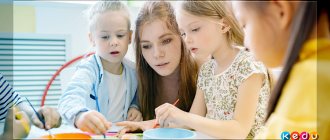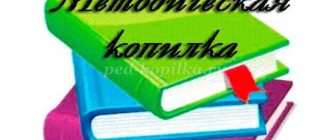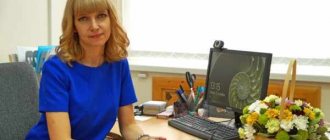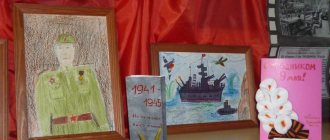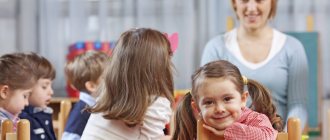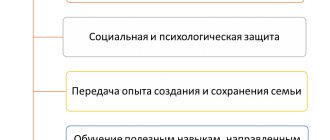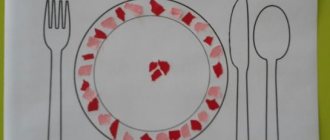Assisting a preschool teacher in planning self-education work
Assisting the teacher in his self-improvement is one of the conditions for the successful operation of any preschool organization. Although the initiative should come, first of all, from the teacher himself, the assistance of the methodologist (or senior educator) also plays an important role in the issue of self-improvement. It helps solve complex issues or issues that interest a particular teacher.
The methodologist formulates a topic for self-education, identifies specific goals and objectives, organizes the teacher’s work for a certain period (sometimes for several years at once), assists in the phased implementation of the plan, and also helps evaluate the effectiveness of the activity.
Annual professional competitions are held for teachers
If it is difficult for a teacher to decide on a topic, the methodologist conducts individual conversations with him or, as an option, surveys. The methodologist constantly advises colleagues, offering the most relevant methodological sources.
The official title of the position of the methodologist is deputy head/director for educational and methodological work (senior educator/teacher). In most cases, the terms “methodologist” and “senior educator” are synonymous, but it happens that these are two separate positions in the team, and then the senior educator is responsible for part of the groups and reports to the methodologist. Until 1984, in Russia there was also the position of “educator-methodologist” with similar responsibilities.
In addition, the methodologist evaluates the activities of teachers by attending classes and other events related to the organization of preschool education (for example, walks, routine activities), and then helps to summarize the results of the work (arranges consultations for employees, makes a report at the teachers’ council, organizes open viewings).
Objectives of teacher self-education in accordance with federal state educational standards (FSES)
The essence of self-education is the ability to independently acquire new knowledge, as well as acquire skills within the framework of one’s profession.
Self-education of a preschool teacher involves solving problems such as:
- analysis of age characteristics of the group;
- identifying problems;
- introduction of the latest pedagogical developments into practical activities;
- organization of the educational process taking into account the development of technology and current requirements of society.
Forms of self-education for kindergarten teachers
Self-education of a preschool teacher is a multifaceted and diverse activity that is implemented in various forms. Let us highlight the main ones:
- work with modern regulatory documents related to various aspects of preschool education;
- studying methodological literature on your topic, including reading special magazines on the issues of educating preschool children (for example, “Preschool teacher”, “Preschool education”, “Child in kindergarten”, “Hoop”);
- mastering the latest pedagogical technologies, classical and innovative programs, getting acquainted with the best practices of other preschool institutions;
- personal self-improvement.
The preschool methodologist regularly holds pedagogical meetings (teacher councils), where all current issues related to the upbringing and education of children in this kindergarten are discussed. They need to be built in such a way that every teacher can learn something new and useful for their work. During the teachers' meeting, it is advisable not only to discuss theoretical issues, but also to conduct trainings and analyze each other's experience.
In addition, as part of teacher councils, a senior teacher can provide consultations to his colleagues on reviewing new teaching literature, familiarizing himself with regulations, and so on. Let us note that it is also possible to involve a speech therapist, a medical worker, as well as a child psychologist (if there is one in the children's institution) in such work.
Working in a kindergarten requires teamwork and creativity from teachers
Another form of self-improvement for teachers is a training seminar, which can be organized both within a kindergarten and at the level of a district methodological association. At such an event, educators train their teaching skills.
From time to time, all preschool specialists must undergo advanced training courses, which usually involve the preparation and defense of a final project. The decision to enroll in such courses and select a program that is relevant for a particular teacher is made jointly with the management. It is important that the educational institution conducting the courses has the appropriate license.
Open viewings are important for the self-education of a kindergarten teacher. They are useful both for the one conducting the lesson (the teacher demonstrates his own work) and for the audience (they borrow teaching experience, learn to analyze what they see).
Reporting documentation (workbook, folder)
The educator’s self-education is consistent with state regulations and involves maintaining certain documentation. The teacher starts a methodological folder where he collects useful articles on the chosen topic, interesting notes on educational activities, samples of fiction (if the topic is related to it), riddles, photographs from events, and so on.
A music director who has mastered additional functionality can also become a methodologist.
Be sure to develop a work plan for self-education for the year: this helps to optimally organize future activities and bring them into a coherent system. When drawing up a plan, first the topic is written, then an explanatory note, which justifies the relevance of the topic. Then all the annual work is outlined: familiarization with current methodological literature, activities with children, as well as parents. Please note that at the end of the school year (May), the teacher also reflects his experience in writing by preparing a special folder. The teacher places there photocopies of articles, consultations, descriptions of experiments, notes from classes with preschoolers, and so on.
Let us note that self-education should not be perceived only as filling out notebooks, plans, preparing consultations, designing stands, etc. First of all, this is the stimulation of professional growth, as well as personal development of the teacher.
In addition to the annual plan, there is also a long-term plan for education, which outlines work on a specific topic for several years in advance.
The teacher’s responsibilities also include regularly filling out a notebook for his self-education. Notes are made there about the events carried out:
- with students (for example, direct educational activities);
- with parents (preparing leaflets, stands, preparing consultations);
- with teachers (report at the teachers' meeting, etc.);
- about other components of the self-education process (for example, the teacher read a certain book on the topic, purchased a visual aid, attended an event).
Note that such a notebook is usually filled out in any form, for example, with a table.
Table: “Development of coherent speech of preschoolers through play in the context of the introduction and implementation of the Federal State Educational Standard” (fragment of the annual plan)
| Term | Form of work, content | Report form | Perspective |
| 2016–2017 academic year | |||
| September | Selection and study of literature on the topic; didactic games and exercises; plot paintings. | Memos for parents on teaching coherent speech | Compiling a bibliography |
| October | Didactic games aimed at developing children's ideas about people of different professions. | Didactic games for speech development “Cooking soup” | Activation and enrichment of children's vocabulary. |
| November - April | Attending open classes | Compiling an analysis of classes attended | Studying the experience of preschool teachers. Using the accumulated experience in practice when working with children. |
| December | Work on composing (inventing) riddles | Consultation for parents: “Using riddles as a means of developing expressive speech” (moving folder). | Show the role of riddles in the formation of expressive speech. Teach children to solve riddles using diagrams. Develop children's monologue speech. Develop imagination. |
| January February | Theater activities. Staging of fairy tales: “The Cat and the Fox”, “Teremok”, etc. (using finger and table theater). | Practical screening (theater week) | Development of creative independence, aesthetic taste in conveying an image; development of children's speech and emotional orientation. Unlocking children's creative abilities. |
| March | Parent meeting “How games develop a child’s speech” | Screening of the presentation “Speech development of children 5–6 years old” | Help parents create a speech environment for constant communication with their child. |
| April May | Learning counting rhymes and riddles. Finger games | Presentation | Improve speech hearing, consolidate the skills of clear, correct, expressive speech. Differentiation of sounds, words, sentences. Practice tempo, voice strength, diction. |
Author of the development: teacher of general developmental kindergarten No. 8 “Sun” S.V. Petrova (Menzelinsky district of the Republic of Tatarstan).
Specifics of self-education of a methodologist, senior educator
The methodologist of a preschool institution is also engaged in self-improvement activities, so he must be well informed about all the latest developments in the field of preschool education. After all, for other teachers, a methodologist is a kind of expert in the field of what has been printed and published recently on preschool pedagogy. On store shelves you can now find a lot of literature that does not meet scientific requirements.
The methodologist, like all educators, must periodically improve his qualifications. Every year he works on a specific topic for which he draws up a corresponding plan. The goals, objectives of the activity, a list of specific aspects of self-improvement, and expected results are written there.
As for reporting on completed work, it is often formatted in the form of a presentation. The specialist can also prepare a report for presentation at the regional methodological association.
On the topic: methodological developments, presentations and notes
An option for designing a booklet for self-presentation for a competition or certification.
This type of planning was developed for working with children with intellectual disabilities in the 1st year of schooling.
This type of planning was developed for working with children with intellectual disabilities for 2 years of study.
An approximate version of long-term planning of correctional work to familiarize preschool children with problems in intellectual development with elements of decorative and applied arts. T.
An approximate version of the design of correctional and developmental work on the topic “Introducing children of primary preschool age with problems in intellectual development to the origins of Russian culture in the field.”
Structure of a preschooler's portfolioDesign option.
Source
Self-education notebook material (senior group)
Notebook
By
self-education
in senior group No. 3
Kursheva Alina Tagirovna
The most necessary and most difficult thing for a family and for a country is to educate a person.
Moral and patriotic education of children is one of the main tasks of a preschool educational institution. The feeling of the Motherland... It begins in a child with the attitude towards the family, towards the closest people - mother, father, grandmother, grandfather. These are the roots that connect him with his home and immediate environment.
The feeling of the Motherland begins with admiration for what the child sees in front of him, what he is amazed at and what evokes a response in his soul...
And although many impressions have not yet been deeply realized by him, when passed through childhood perception, they play a huge role in the formation of the personality of a patriot. The state is currently trying to restore the lost sense of patriotism and citizenship in the country's citizens, including children. It is a well-known fact: the formation of a person’s personality occurs in preschool age. This fact also applies to the timely formation in preschoolers of a sense of patriotism: love and affection, devotion and responsibility, the desire to work for the good of their native land, to protect and increase its wealth. The question arises - how to ensure proper educational work in preschool educational institutions in order to instill in preschoolers value orientations, citizenship, patriotism and love for their Small and Large Motherland? For more fruitful work on the patriotic education of preschool children, it is necessary to use the following ways and means of patriotic education:
- Direct observation of social reality (constant enrichment of the subject-development environment);
- Fiction and all types of art;
- Folk art (introducing children to the customs, traditions, culture of their native people);
- Family involvement.
Relevance of the topic:
It is very important that children understand as early as possible that the big Motherland is Russia, the Russian Federation, it is one for everyone who was born in its vastness, who loved it, who makes efforts to make it even more beautiful, richer, and become a powerful power. And each of us needs to be able to be useful to her. And for this you need to know and be able to do a lot; From childhood, do things that would be for the benefit of your home, kindergarten, city, and in the future - for the benefit of the whole country. Acquaintance with the great Motherland - Russia - is the third main stage of moral and patriotic education of children. If a person cares about the Motherland, it means that he is its son, and that means Russia is the Motherland for him.
Target:
Increasing your theoretical level, professional skills and competence on this topic: study the ways, means and methods of patriotic education of preschoolers 5-6 years old.
Tasks:
- Analyze the literature on this topic.
- To study the principles of patriotic education of children 5-6 years old in kindergarten.
- Develop a card index of games for the patriotic education of 5-6 year old children in kindergarten.
- Set up a corner for patriotic education in the group.
- Orient the family towards the spiritual, moral and patriotic education of children.
The period of senior preschool age is conducive to the education of patriotic feelings, since it is at this time that the formation of cultural and value orientations, the spiritual and moral basis of the child’s personality occurs, the development of his emotions, feelings, thinking, mechanisms of social adaptation in society, and the process of self-awareness in the world around him begins. . Also, the period of senior preschool age is favorable for the emotional and psychological impact on the child, because images of perception of reality and cultural space are very bright and strong and therefore remain in the memory for a long time, and sometimes for a lifetime, which is very important in the education of patriotism.
Objectives of patriotic education of preschool children:
1. Formation of a feeling of attachment to your home, kindergarten, friends in kindergarten, and your loved ones.
2. Formation of a feeling of love for one’s hometown based on familiarization with one’s native nature, culture and traditions, familiarity with events and phenomena of public life, and the history of the state.
3. Formation of ideas about Russia as a native country, about Moscow as the capital of Russia
4. Fostering patriotism and respect for the cultural past of Russia through the means of aesthetic education: music, art activities, artistic expression.
5. Fostering civic-patriotic feelings through the study of state symbols.
6. Formation of love for one’s people, native language, folk art.
7. Introducing children to geography, sights of their hometown, cultural monuments and famous people.
Work on moral education should be carried out regularly and in a systematic manner. A large role is given to the creation of conditions, a variety of techniques and methods in working with children. You need to start working on patriotic education by creating a warm, cozy atmosphere for children. Every day of a child in kindergarten should be filled with joy, smiles, good friends, and fun games.
Methods and forms of work:
- conversation,
- games,
- reading fiction,
- creative task,
- excursions to express museums of folk art,
- artistic creativity,
- work activity,
- working with parents,
- theatrical activity.
Work plan for the year
| Chapter | Deadlines | Form | Practical |
| plan | work | exits | |
| N.F. Vinogradova | |||
| "Our Motherland" | |||
| HELL. Zharikov | |||
| "Raise children | |||
| patriots", | |||
| E.I. Korneeva | |||
| "Folklore | |||
| holidays and times | |||
| Studying | attractions in path- | ||
| methodological | September- | riotic re- | |
| literature | May | preschool nutrition | |
| nicks", | |||
| R.H. Hasanova “I want to know my homeland” | |||
| O. L. Knyazeva, | |||
| M. D. Makhaneva | |||
| "Involving children | |||
| to the origins of Russian | |||
| folk culture | |||
| ry", | |||
| M. F. Litvinova | |||
| "Russian national | |||
| outdoor games | |||
| for preschool children | |||
| nogo and junior | |||
| school age | |||
| ta: practical poso- | |||
| bee", | |||
| M. A. Klyucheva | |||
| "People's sub- | |||
| visionary children's | |||
| games | |||
| Conversation on the topic | Exhibition of drawings | ||
| Job | "Family" | "My family" | |
| With | September | GCD on the topic | Looking at illustrations of landmarks |
| children | "Ufa is the capital | Ufa | |
| our Motherland" | |||
| Didactic selection | Game index | ||
| tic games by | |||
| patriotic | |||
| education. | |||
| Conversation on the topic | Exhibition of drawings | ||
| "My street" | "The street where I | ||
| October | I live" | ||
| GCD on the topic | Compilation of photo albums | ||
| "Tour of | boma "My beautiful" | ||
| Ufa" using | Ufa" | ||
| calling ICT | |||
| Familiarization with | Exhibition of works | ||
| symbolism | children's creativity: | ||
| November | Bashkortostan and Russia | collective appli- | |
| cation "Flowers of Bashkortostan" | |||
| (our flag) | |||
| Decoration corner- | Decorated corner | ||
| ka in the children's group | with symbols of Bashkortostan | ||
| Whose garden is “My | |||
| Small Motherland - Bashkortostan" | |||
| Lepbook “Traditions and life of the Bashkoir people” | |||
| GCD on the topic | Exhibition of drawings | ||
| "Journey through | "Map of Russia" | ||
| December | cities of Russia" | ||
| using | |||
| ICT | |||
| Familiarization with | Exhibition of works | ||
| folk holidays | children's creativity | ||
| nicknames in Rus'. | on the theme of the New Year and | ||
| Christmas | |||
| GCD on the topic | Exhibition of drawings | ||
| "New Year | “Such a different Grandfather | ||
| walks around the planet" | Freezing" | ||
| using | |||
| ICT | |||
| Listening | |||
| musical | |||
| works: | |||
| R. Schumann “In Winter”, | |||
| "Father Frost", | |||
| P. Tchaikovsky | |||
| from the series “Times” | |||
| year: “December. | |||
| Christmastide", from the ballet | |||
| "Nutcracker": | |||
| "Morning prayer" | |||
| va", "Dance of the snow- | |||
| Zhinok", "Winter | |||
| morning", | |||
| Consideration of illustrations with customs and traditions of the Russian and Bashkir people | |||
| Familiarization with customs and traditions | |||
| January | tions of Russian | ||
| and the Bashkir people | |||
| Examination of the painting by Akhmetshin R.F. "Ural winter" | |||
| Reading fiction | |||
| literature | |||
| Russian national | |||
| fairy tales: | |||
| "Bubble, straw- | |||
| ka and bast shoes,” | |||
| "Winter quarters of animals" | |||
| "Magic ring" | |||
| tso", "Sivka-burka" | |||
| Meeting children | Exhibition of drawings | ||
| with the Russian people | "Blue-blue Gzhel" | ||
| February | crafts | ||
| Preparing for | Sports festival, | ||
| holiday | dedicated to the Day | ||
| "Day of Defenders" | defenders of the Fatherland | ||
| Fatherland" | |||
| Conversation on the topic | Exhibition of children's | ||
| “My mother is the best | works "Portrait | ||
| March | Shay in the world! | moms" | |
| GCD on the topic | Exhibition of children's | ||
| "Dear Granny" | works “Handkerchief for | ||
| beloved grandmother" | |||
| (applique) | |||
| Reading fiction | |||
| literature | |||
| Nanai fairy tale | |||
| "Ayoga" | |||
| Nenets fairy tale | |||
| "Cuckoo", | |||
| A. Milne | |||
| "Naughty | |||
| Mother", | |||
| D. Gabe “My | |||
| family", | |||
| E. Early | |||
| "Kindness" | |||
| Project "Big | Quiz “What are you | ||
| cosmic | do you know about space? | ||
| April | journey" | ||
| Meeting children | Exhibition of children's | ||
| with famous | works “Space through the eyes of | ||
| people | children" | ||
| "Yuri Gagarin - | |||
| first cosmonaut" | |||
| Conversation on the topic | Collective appli- | ||
| "Our house is in | cation "Space" | ||
| Universe" | collage" | ||
| Reading fiction | |||
| literature | |||
| Chapters from a fairy tale | |||
| N. Nosova “Nez- | |||
| Nike on the Moon" | |||
| P. Klushantsev | |||
| "What did he tell you about? | |||
| telescope?", | |||
| V. Medvedev | |||
| "Starship "Brun- | |||
| ka", | |||
| A. Leonov “Steps” | |||
| over the planet" | |||
| V. Borozdin “Per- | |||
| in space", | |||
| V. Kashchenko “Nai- | |||
| di constellations" | |||
| Meeting children | Leisure dedicated to | ||
| with the main holidays | Victory Day | ||
| May | Russian nicknames | ||
| GCD on the topic | Creating an Album | ||
| "Victory Day, like | "Our Heroes" | ||
| he was from us | |||
| far away!” | |||
| Reading fiction | |||
| literature | |||
| S. Alekseev | |||
| "First night | |||
| ram", "House", | |||
| M. Isakovsky | |||
| "Buried here | |||
| Red Army soldier", | |||
| A. Tvardovsky | |||
| "Tankman's Tale" | |||
| A. Mityaev | |||
| "Bag of Oatmeal" | |||
| S. Baruzdin | |||
| "Glory", | |||
| K. Simonov “Son” | |||
| artilleryman" | |||
| Consultation | |||
| Work with | "Walking around | ||
| parents | September | City streets" | |
| Consultation | |||
| "Upbringing | |||
| October | little citizen | ||
| Danina" | |||
| Consultation | |||
| "What to read with | |||
| November | a child about symbolic | ||
| lah of the state?” | |||
| Family | Exhibition of Christmas trees | ||
| contest | and crafts | ||
| December | "In a workshop | for group decoration | |
| Santa Claus" | for New Year's | ||
| holiday | |||
| Selection of illustrations | The book "Russian people- | ||
| January | tions for the book | new creativity" | |
| "Russian folk | |||
| creation" | |||
| Leisure for dads and | Collage | ||
| February | grandfathers | "My dad (grandfather) | |
| "Day of Defenders" | served in the army" | ||
| Fatherland" | |||
| Contest | Exhibition of works, | ||
| “Come on, | done by mothers | ||
| March | girls!" | and grandmothers | |
| children | |||
| Consultation | Exhibition of joint | ||
| April | “We read to children | work of children and parents | |
| about space" | lei "Our planet - | ||
| Earth" | |||
| Consultation | |||
| "Upbringing | |||
| May | patriotic | ||
| feelings in preschoolers | |||
| nicks" | |||
| Collection of photographs | Album "Our Heroes" | ||
| for registration | |||
| album production | |||
| "Our Heroes" | |||
